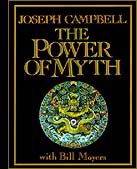
Read below. How might we connect these ideas to Life & Times of Michael K? Write a short piece in response to some aspect that engages you (and/or in response to a classmate). Due 11/29
Joseph Campbell: excerpts from The Power of Myth
CAMPBELL: Myths are clues to the spiritual potentialities of the human life…
MOYERS: You changed the definition of a myth from the search for meaning to the experience of meaning.
CAMPBELL: Experience of life. The mind has to do with meaning. What’s the meaning of a flower? There’s a Zen story about a sermon of the Buddha in which he simply lifted a flower. There was only one man who gave him a sign with his eyes that he understood what was said. Now, the Buddha himself is called “the one thus come.” There’s no meaning. What’s the meaning of the universe? What’s the meaning of a flea? It’s just there. That’s it. And your own meaning is that you’re there. We’re so engaged in doing things to achieve purposes of outer value that we forget that the inner value, the rapture that is associated with being alive, is what it’s all about. (p. 5).
CAMPBELL: The dictionary definition of a myth would be stories about gods. So then you have to ask the next question: what is a god? A god is a personification of a motivating power or a value system that functions in human life and in the universe--the powers of your own body and of nature. The myths are metaphorical of spiritual potentiality in the human being, and the same powers that animate our life animate the life of the world. But also there are myths and gods that have to do with specific societies or the patron deities of the society. In other words, there are two totally different orders of mythology. There is the mythology that relates you to your nature and to the natural world, of which you're a part. And there is the mythology that is strictly sociological, linking you to a particular society. You are not simply a natural man, you are a member of a particular group. In the history of European mythology, you can see the interaction of these two systems. Usually the socially oriented system is of a nomadic people who are moving around, so you learn that's where your center is, in that group. The nature-oriented mythology would be of an earth-cultivating people.
Now the biblical tradition is a socially oriented mythology. Nature is condemned … But when nature is thought of as evil, you don’t put yourself in accord with it, you control it, or try to, and hence the tension, the anxiety, the cutting down of forests, the annihilation of native people. And the accent here separates us from nature. (pp. 22-23)
CAMPBELL: The story that we have in the West, so far as it is based on the Bible, is based on a view of the universe that belongs to the first millennium B.C. It does not accord with our concept either of the universe or of the dignity of man. It belongs entirely somewhere else.
We have today to learn to get back into accord with the wisdom of nature and realize again our brotherhood with the animals and with the water and with the sea…
MOYERS: Don’t you think modern Americans have rejected the ancient idea of nature as a divinity because it would have kept us from achieving dominance over nature? How can you cut down trees and uproot the land and turn the rivers into real estate without killing God?
CAMPBELL; Yes, but that’s not simply a characteristic of modern Americans, that is the biblical condemnation of nature which they inherited from their own religion and brought with them, mainly from England. God is separate from nature, and nature is condemned of God. It’s right there in Genesis: we are to be the masters of the world.
But if you will think of ourselves as coming out of the earth, rather than having been thrown in here from somewhere else, you see that we are the earth, we are the consciousness of the earth. These are the eyes of the earth. And this is the voice of the earth.
You can't predict what a myth is going to be any more than you can predict what you're going to dream tonight. Myths and dreams come from the same place. They come from realizations of some kind that have then to find expression in symbolic form. And the only myth that is going to be worth thinking about in the immediate future is one that is talking about the entire planet, not the city, not these people, but the planet, and everybody on it.
This is the ground of what the myth is to be. It's already here: the eye of reason, not of my nationality; the eye of reason, not of my religious community; the eye of reason, not of my linguistic community. Do you see? And this would be the philosophy for the entire planet, not for this group, that group, or the other group.
When you see the earth from the moon, you don't see any divisions there of nations or states. This might be the symbol, really, for the new mythology to come. That is the country that we are going to be celebrating. And those are the people that we are one with. (pp. 40 -41)
